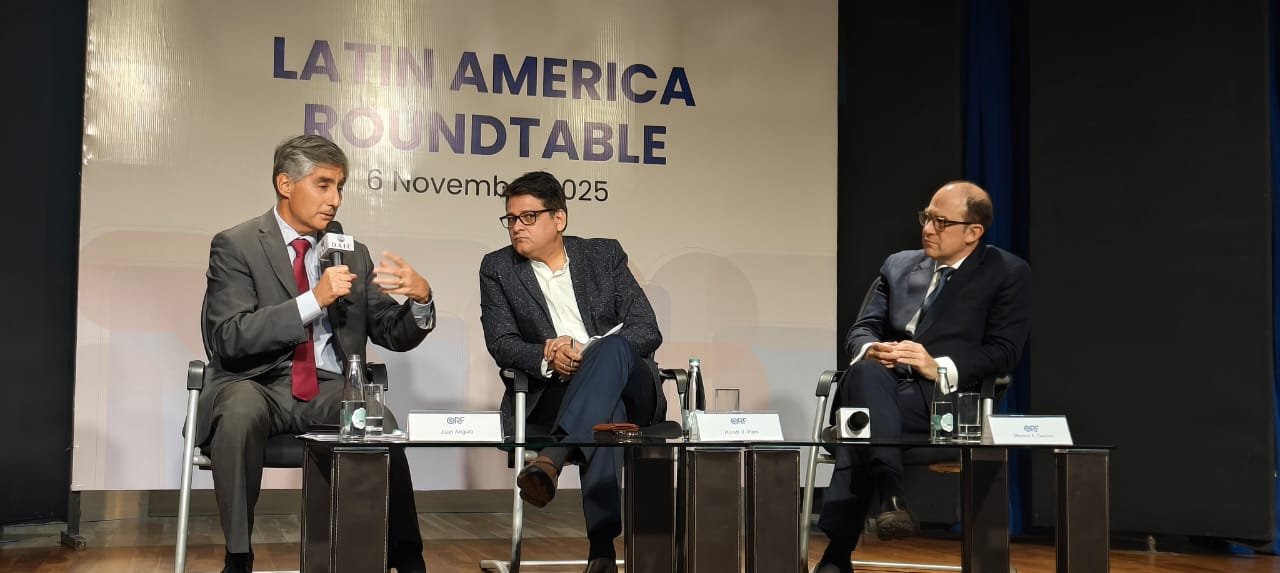
The Observer Research Foundation (ORF) organised a Latin America Roundtable on 6th November in New Delhi. In discussion with H.E. Juan Angulo, Ambassador of Chile to India and H.E. Mariano A. Caucino, Ambassador of Argentina to India, the session was moderated by Prof. Harsh V. Pant, Vice President – Studies and Foreign Policy at ORF. The dialogue explored the shifting geopolitical landscape, the evolving contours of India–Latin America engagement, and the emerging opportunities for deeper cooperation.
Prof. Harsh V. Pant noted that while India–Latin America ties have historically been shaped by geographical and diplomatic distance, that narrative no longer holds. “The relationship today,” he said, “is defined not by separation but by opportunity.”
Navigating Great-Power Competition
Opening the dialogue, Prof. Pant asked how Latin American states are approaching their foreign policy priorities, given their geographic proximity to the United States and the intensifying US–China rivalry.
H.E. Juan Angulo, Ambassador of Chile, emphasised that Latin American countries reject being placed into rigid geopolitical camps. “The world today is not black and white; it is full of shades of grey,” he stated. “Latin American countries do not want to be forced into binary choices. Our focus is on protecting national interests through flexibility and diplomacy.”
Chile’s longstanding open-economy model, he explained, has enabled it to remain outward-looking and adaptable.
“We adopted a uniform tariff of 6% nearly 45 years ago. No one can say Chile is protectionist. Our strength lies in adapting, economically, politically, and institutionally, to a rapidly changing global environment.”
H.E. Mariano A. Caucino, Ambassador of Argentina, echoed this sentiment but highlighted a key structural contradiction shaping the region. “Politically, we are anchored in the West. Economically, our future growth is tied to the Indo-Pacific — including India.”
He noted that the United States and China are the two major strategic influences globally today, but India is increasingly an important player in Latin America’s economic landscape.
“China is already the second-largest trading partner for Argentina and, for some in the region, the first. India is also among our key partners. The complementarity between Latin American resources and Asian demand is real and growing.”
Internal Challenges and Regional Governance
The conversation then turned to internal political dynamics, migration, democratic pressures, and institutional resilience.
Amb Caucino described the region’s democratic challenges candidly, “We do not yet have sufficient regional institutional capacity to respond to governance or migration crises. We are trying, but polarisation and inequality remain serious concerns.”
Yet, he underscored that Latin America remains one of the most peaceful regions in the world in terms of interstate conflict.
“We resolved border disputes decades ago and declared the region nuclear-weapon-free. The challenge now is ensuring that democracies deliver economically and socially. When institutions fail, frustration grows — and that opens the door to extremes.”
Amb Angulo added that while democratic systems have held firm, expectations are rising, “We must confront corruption and strengthen institutions. People need to see that democracy can solve everyday problems — employment, security, and opportunity.”
Natural Resources, Industrial Futures, and Partnership with India
Prof. Pant’s final question centred on Latin America’s role as a global supplier of copper, lithium, and agricultural products — and how countries can ensure sustainable development rather than resource dependency.
Amb Caucino highlighted the importance of value addition, “Natural resources are an opportunity, but not enough. Lasting prosperity requires investment in technology and innovation. We welcome investment — from India, China, and others — but with a focus on industrial development, not just extraction.”
Amb Angulo pointed to Chile’s strategy of building full value chains, “Our goal is not simply to export lithium, but to process it and participate in downstream sectors, including battery production.”
He emphasised that innovation and cooperation with India will be central to this transition. “Economic success will depend on technology, services, connectivity, and people-to-people exchange. Agreements like CEPA are not just about tariffs; they are about building trust.”
Looking ahead, he expressed optimism, “We believe that cooperation between India and Latin America can expand opportunities for both regions.”
Leave a Reply